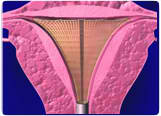A survey of menstruating women age 35‑49 years old reported the following:
- 58% with excess menstrual bleeding have not discussed it with a health care provider
- 82% of women who discussed heavy periods had to initiate the discussion
- 62% waited more than one year, and 1 in 5 waited more than 5 years to discuss it with their doctor
A classic study in 1966 compared a woman’s perception of their menstrual flow to actual measurements. Surprisingly, half the women with heavy periods rated it as normal or light. So asking a straightforward question “Is your period normal?” fails to reveal many who are afflicted with losing too much blood, and consequently anemia and fatigue. These women have been labeled “Silent Sufferers.”
Taking a different approach a study in the British Journal of Medicine reported 1 in 5 women responded “yes” to the question, “Does your period disrupt your life?— such as work, activities, or sex” Notice the question is not judging whether the amount of bleeding is normal or not, but rather focuses on impact on lifestyle.
Evaluation of abnormal uterine bleeding includes blood tests, a pelvic ultrasound, and for women over 40 an endometrial (uterine) biopsy to exclude cancer. We offer women the convenience and efficiency of a complete work‑up in a single office visit scheduled within one workday when you call us. We can then promptly move on to solutions.
Since bleeding originates from the inside lining of the uterus, treatments target this tissue. The good news is there are often alternatives to hysterectomy (the removal of the uterus).
Hormonal therapy (Birth control pills or progesterone minimize growth of the inside uterine lining)
Mirena IUD (Delivers progesterone directly to the uterine lining, so less side effects)
Lysteda (Non‑hormonal medicine taken while on period)
Endometrial Ablation (Preserves uterus as it permanently removes uterine lining so it doesn’t grow back)
Hysteroscopic Resection of polyps & fibroids (Remove growths from within the uterine cavity)
Hysterectomy (Preferably minimally invasive such as laparoscopic or vaginal; preserve ovaries & female hormones)
So if you or you know someone suffering with bleeding that’s too much (eg. Leaking through tampons or pads), too long (over 1 week), or too often (periods occur more frequently then every 3 weeks); then get evaluated so you can proceed with treatments that will help improve your life.












Very informative article post.Really looking forward to read more. Really Great.